

Hurricane Katrina, 10 Years Later
The Photos That Moved Them Most

t was close to midnight aboard the Commander Kazakos, a Greek coast-guard vessel, when the first migrant boat of the nightly patrol appeared on the screen of the captain’s radar – a tiny green blip representing a motorboat packed with 47 desperate souls. Running across the deck, Petty Officer Kyriakos Papas shouted, “We have a target!” And the ship steered a course toward the migrants.
Over the past year, the 10-man crew of the Commander Kazakos has patrolled the front lines of the largest mass migration into Europe since World War II. At first the job offered little excitement: one or two boats full of migrants, mostly fleeing the civil war in Syria, needed to be rescued on a typical night this spring from the rubber motorboats they use to reach the Greek islands from the western coast of Turkey. But by the end of August, the coast guards couldn’t keep up. “One night I looked at the radar and saw eight of their boats coming toward us in a line,” recalls Border Guard Dmitrious Argyropoulos. “I thought to myself, ‘This can’t be happening.’”

happening almost every day. More than a quarter-million migrants have reached the Greek islands by boat so far this year on their way to claim asylum in Western Europe, and nearly 3,000 have died in the attempt, according to the Greek government. The islands where the boats come ashore have been inundated with the new arrivals, forced to build camps to house them and to charter cruise ships to move them to the mainland. But in spite of all this, the Greek coast guards never turn back an incoming boat. Their aim is to rescue its passengers and bring them safely to European shores.
Each night, the Commander Kazakos sets out on another of these missions from one of two ports on the island of Leros, an arid sliver of land that hosts a few resorts for tourists on a budget, and on Sept. 6, the ship’s crew allowed a TIME reporter and photographer to come along on a patrol. Their vessel turned out to be an old Dilos-class workhorse, built in 1979 and originally designed to help the American military patrol the rivers of Vietnam.
It was a cramped but cozy home for the patrolmen. A few Orthodox icons of St. Nicolas, the patron saint of sailors, decorated the wall above the radio console, and a seafaring dog named Sara barked half-heartedly when the journalists came aboard. It then took about half an hour for the ship to reach the maritime border with Turkey, and a few of the crewmen spent that time smoking below deck and recalling some of their encounters with the migrants and the people who traffic them.
About a week earlier, they said, a navy patrol had come across a sailing boat suspected of smuggling migrants, and when an officer came aboard to inspect it, a Turkish trafficker hit him in the face with a hammer. On seeing this, another patrolman took aim at the smuggler from aboard the naval ship and fired a single shot. “But he missed,” recalled Argyropoulos. The stray bullet, piercing the hold of the sail boat, wounded a 15-year-old boy who had been hiding there along with dozens of other migrants. The boy survived, as did the injured naval officer, while the smuggler was arrested.
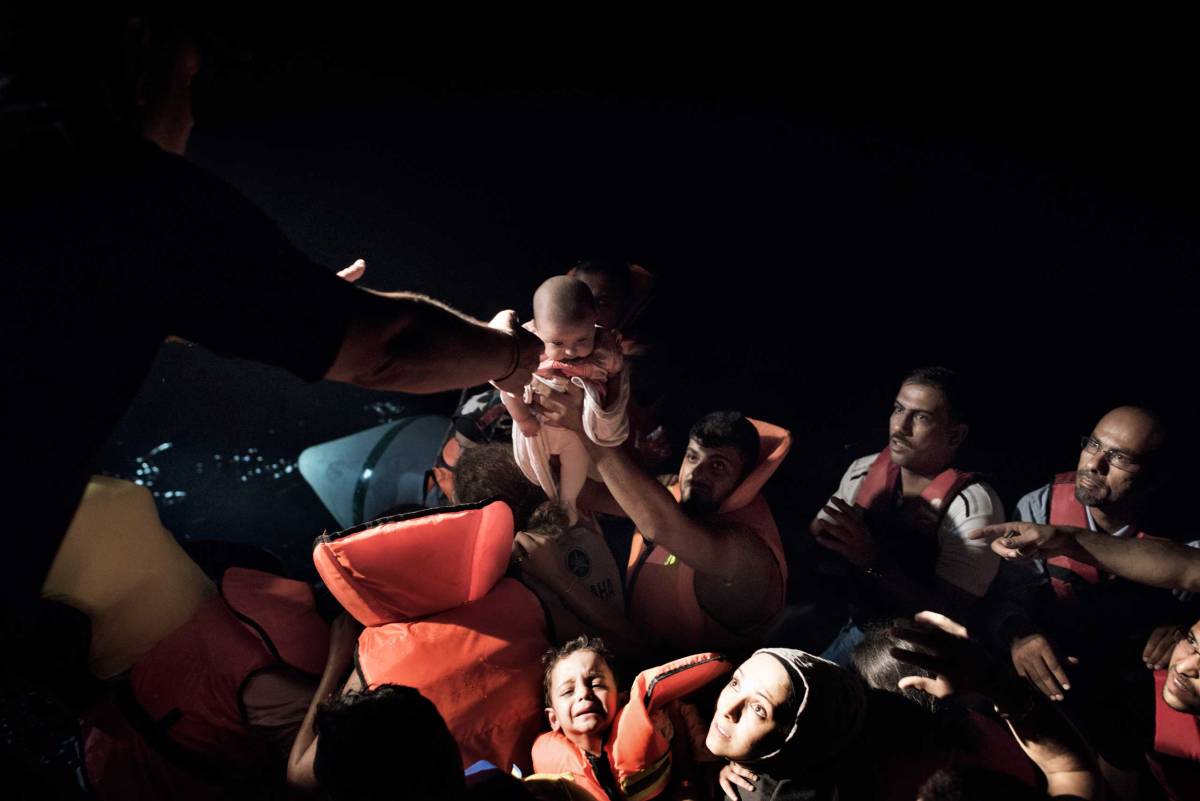
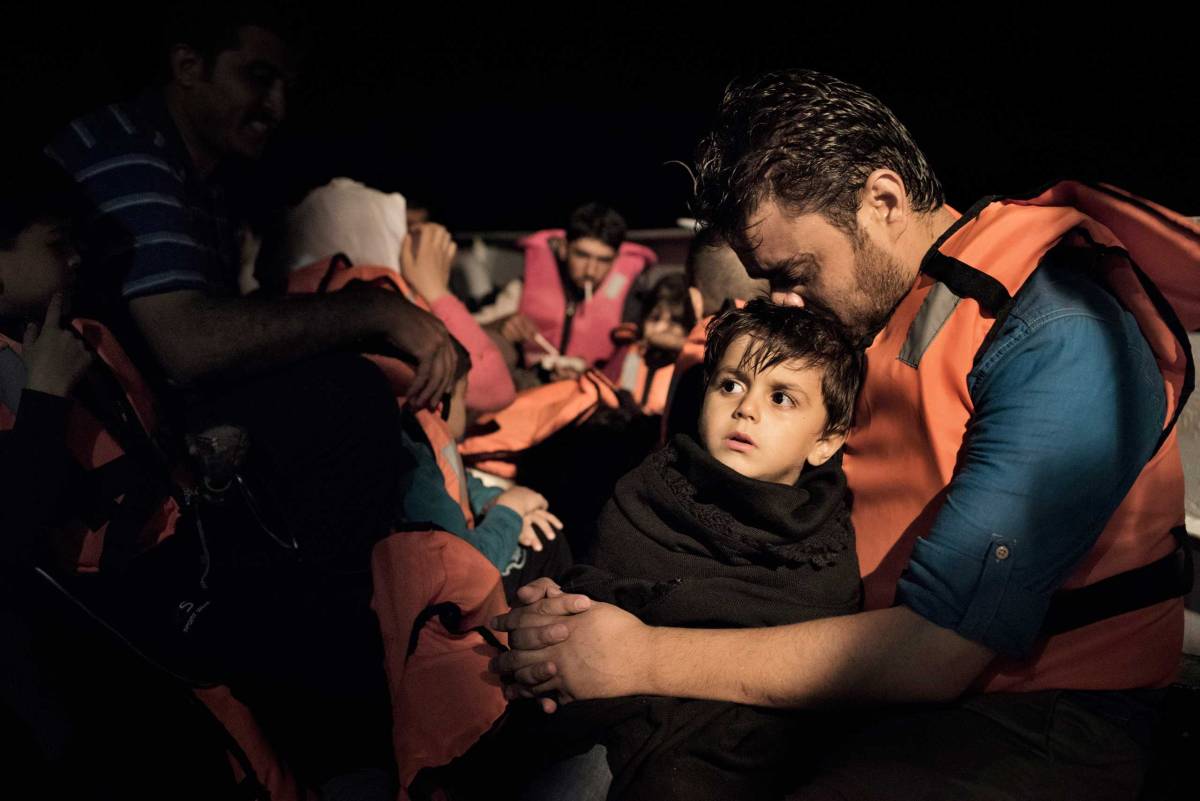
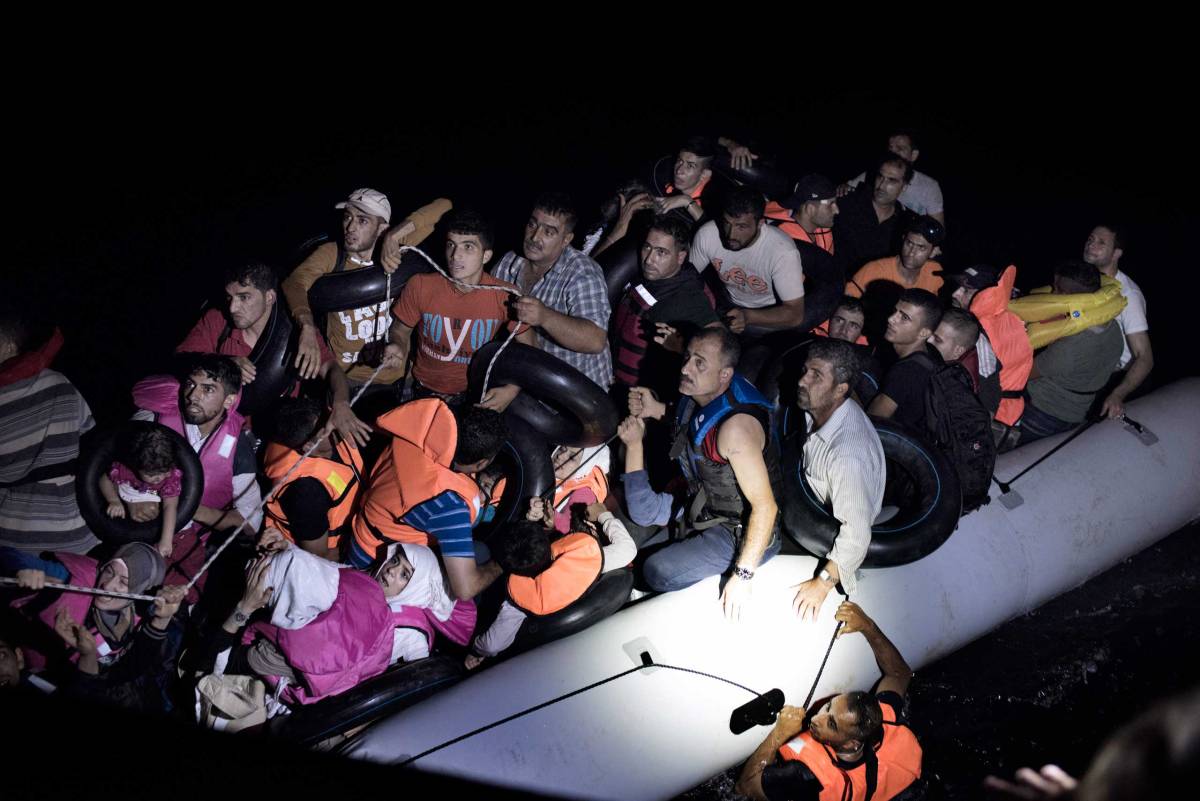
The human traffickers, though, are only part of the problem for the Greek coast guards, who say none of the smuggling rings would be able to operate without the connivance of Turkish authorities. “Their coast guards escort [the smugglers’ ships] all the way to the border,” said Papas, the ship’s petty officer. “We see them! We see the migrant boats on our radar and tell the Turkish side the coordinates,” he added. “And they say they don’t see anything.” (With nearly two million Syrian refugees now on its territory, the Turkish government would seem to have plenty of incentive to clear them out as fast as possible. But Ankara has insisted that it is doing everything in its power to combat human traffickers operating on Turkey’s western coast.)
Considering the sheer number of boats the Commander Kazakos has intercepted over the past year, one might expect them to react to the latest one with something like indifference. The opposite was the case. When the boat appeared on the radar, the entire crew ran to their positions, coordinating with the nearest naval base over the radio and watching for the migrant boat with the help of a night-vision telescope. Costas Firintzogrou, a harbor guard on the ship who serves as its resident weapons expert, strapped on a bullet-proof vest and a sidearm, just in case they would find a smuggler among the migrants.
 It was just another one of the rubber dinghies that the migrants steer themselves, this one packed with 47 people, including about a dozen women and children. As the coast guards approached, their challenge was to convince the migrants that they were here to help. The bulk and military aspect of the ship did not make this easy. Besides, smugglers on the Turkish coast instruct the migrants to head straight toward the nearest Greek island and not to stop for any reason. So the man steering the boat ignored the coast guards demands to cut the engine. A hectic and circular chase ensued.
It was just another one of the rubber dinghies that the migrants steer themselves, this one packed with 47 people, including about a dozen women and children. As the coast guards approached, their challenge was to convince the migrants that they were here to help. The bulk and military aspect of the ship did not make this easy. Besides, smugglers on the Turkish coast instruct the migrants to head straight toward the nearest Greek island and not to stop for any reason. So the man steering the boat ignored the coast guards demands to cut the engine. A hectic and circular chase ensued.
At one point, in his desperation to escape, or perhaps because he didn’t know how to properly work the rudder, the steersman on the migrant boat rammed it into the side of the coast guard vessel, right near the point where its anchor protrudes. This maneuver could easily have sunk the boat and forced the coast guard to pluck all of its passengers from the water. Because the water is cold this far out to sea, “We have minutes to do this,” said Papas, the petty officer. “If we don’t pull them out fast, they die.”
But the rescue went smoothly, all things considered. When the migrants finally realized the coast guards were Greeks and meant them no harm, they grabbed the rope that was thrown to them and hoisted themselves aboard the ship. It was shocking to see the men scrambling up first, even making the effort to save their backpacks while the women and children cried for help. Infuriated by such cowardice, the coast guards pushed the men back down into the dinghy and helped the more vulnerable passengers climb aboard.
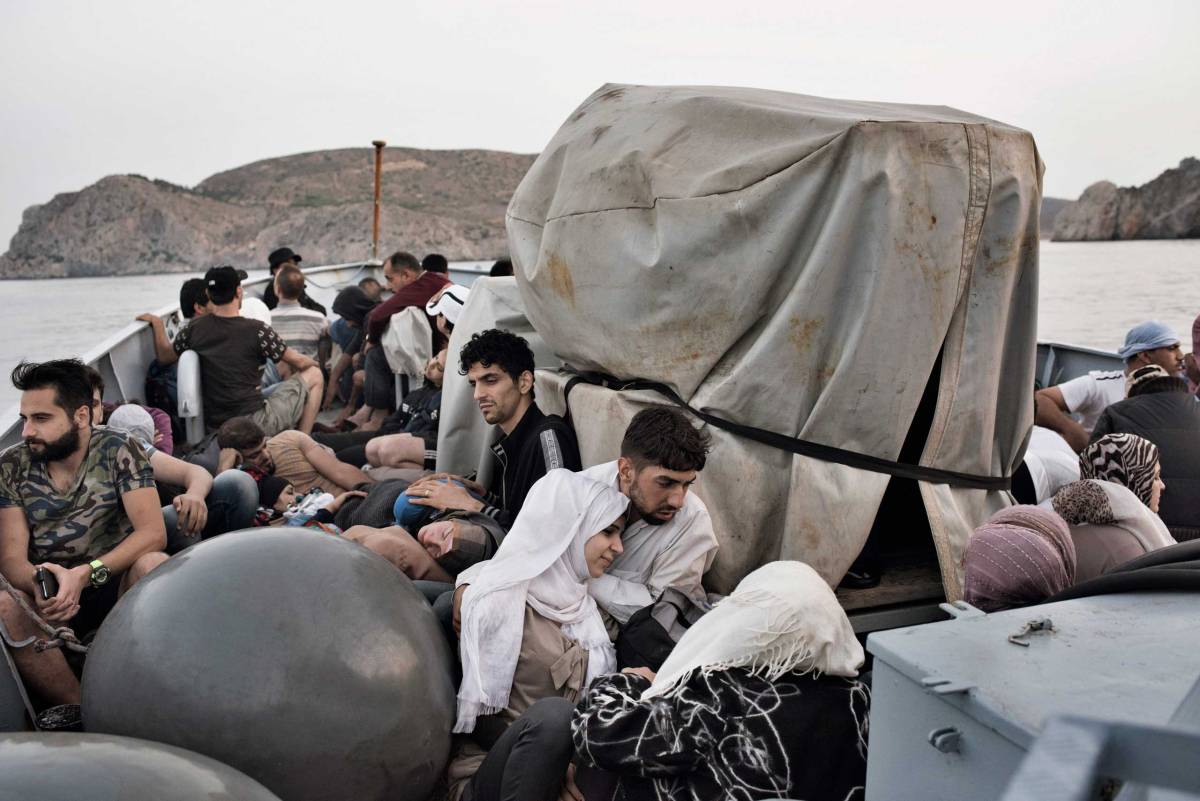
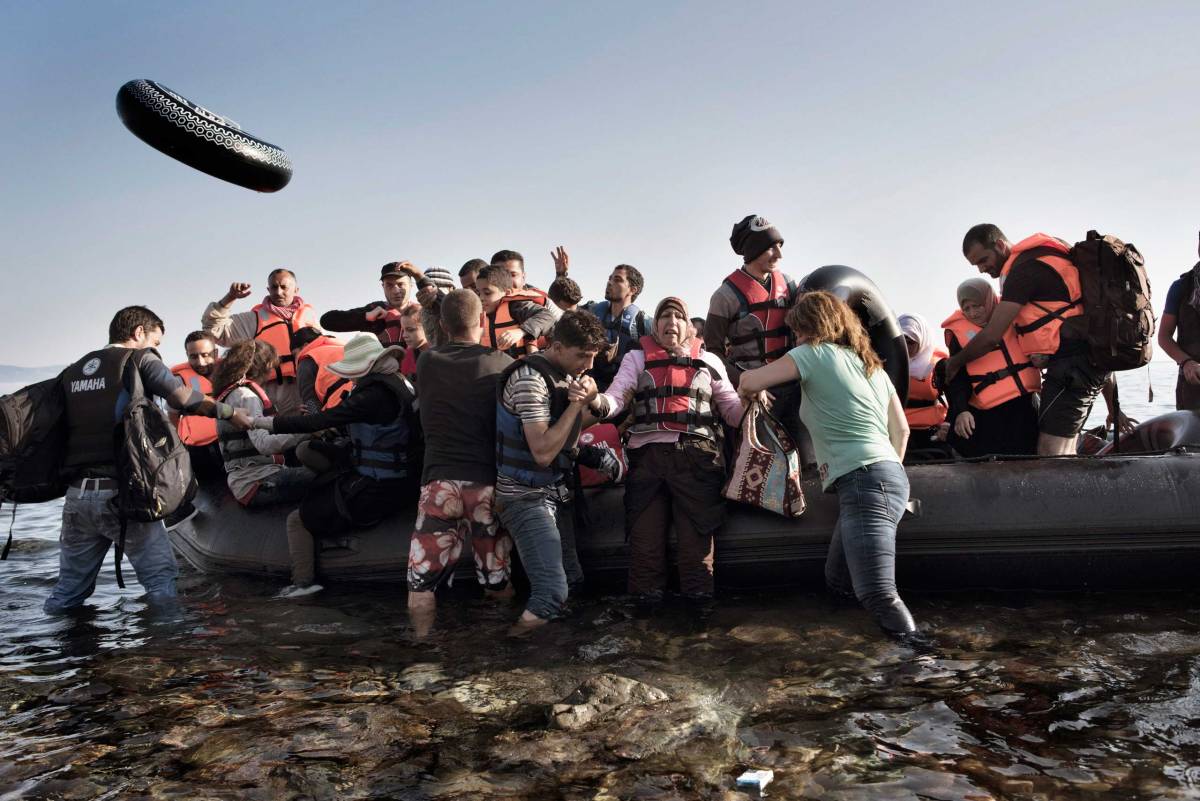
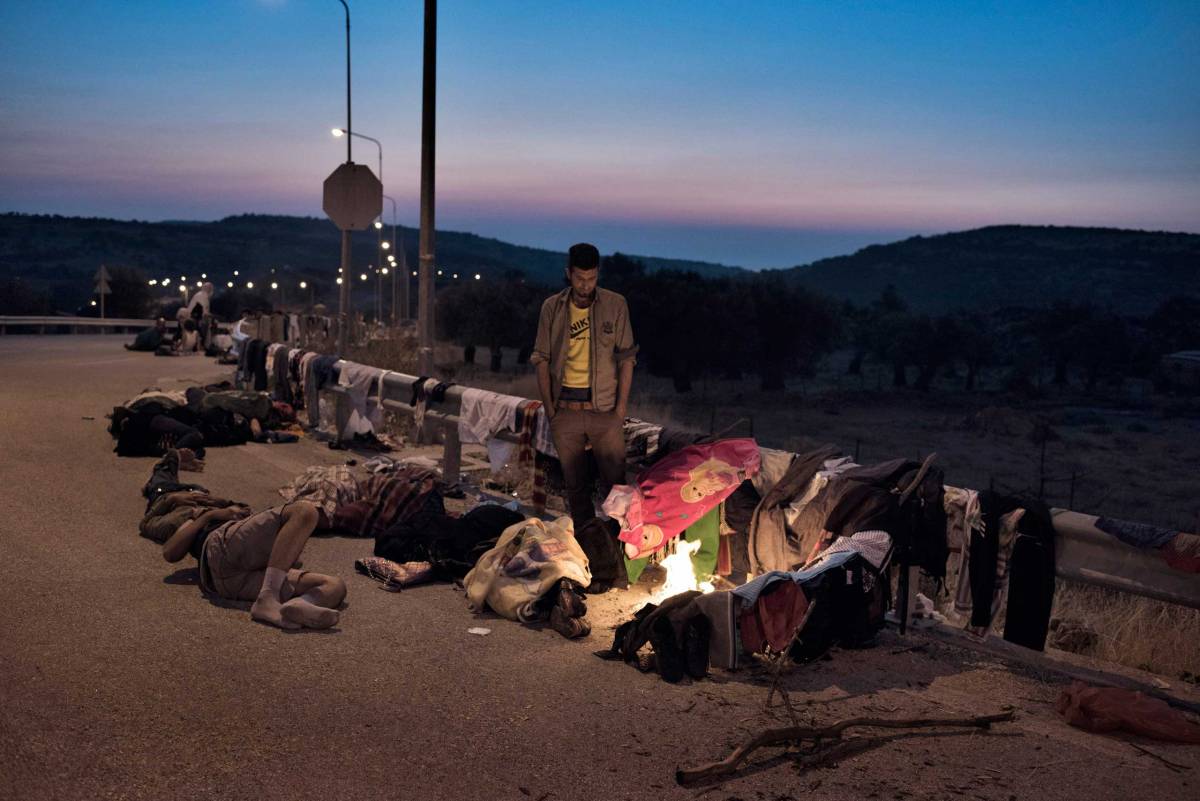
Then they were all counted and transported, crouching in the bow of the ship, to the island of Farmakonisi, an uninhabited rock in the Aegean Sea that hosts a small Greek naval base. Two of its soldiers came out to meet the Commander Kazakos on the pier and welcome the migrants. They would wait there till morning before being moved to the nearby island of Leros, where police would register their arrival.
After a cigarette break at the naval base, the coast guards set out to catch the next boat. It had already appeared on the radar, another rubber dinghy plowing through the darkness with 43 people on board. Among them, it turned out, was a couple of newly weds, Muhdi and Sanaa Salem, both Syrians who said they’d been married three days earlier in Izmir, Turkey, a common transit point for migrants headed to Europe.

said Muhdi in nearly perfect English. They were traveling with five of their relatives: Muhdi’s mother, his two sisters, his brother-in-law and a nephew, all of them pressed together for solace as well as for warmth.
Asked why they’d decided to make such a dangerous journey, Muhdi said, referring to his hometown of Damascus, “We have nothing there anymore. We don’t have a taste of life there. So we decided to start a new one, and whatever happens, happens.”
Most of the passengers on the two rescued boats that night said they were from the suburbs of Damascus, which has been besieged in recent weeks by the terror group known as the Islamic State. A third boat, which the coast guard initially suspected of being a smuggler’s fishing vessel, slipped past the patrol and crashed into the coast of Farmakonisi. Either from the impact or while scrambling ashore, one of the passengers, a migrant from Syria, broke his leg and required treatment at the island’s naval hospital.
It was one of the rare injuries the Commander Kazakos has seen. “We are one of the only ships who has not lost the life of a migrant,” Argyropoulos, the border guard, said proudly. While ferrying the migrants around the Aegean, the officers were surprisingly gracious toward their charges, bringing them water and making sure the women and children are comfortable.
At daybreak, they picked up about 70 of them – the maximum the ship can safely carry – and transported them from the naval base at Farmakonisi into the hands of police on the island of Leros. As they disembarked, the migrants thanked the coast guards and shook their hands, many of them still a little dazed and lost in thought over the strange night they had spent together. Papas, the petty officer, seemed to be the most ambivalent about what the coast guards were doing. “They seem like good people,” he said. “But on every boat, there may be one or two from the jihad. We don’t know, and that’s a big problem for Europe.”
But it’s a problem that other authorities will have to deal with as the migrants are identified and, hopefully, integrated into European society. The coast guards’ mission is purely humanitarian, and after sleeping through the day in the cabin of their ship, they would go out again to look for more migrants pushing ahead toward a life whose troubles they can’t predict with any certainty. They only know that it can’t be worse than the life they left behind.